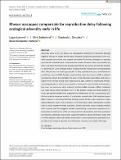Rhesus macaques compensate for reproductive delay following ecological adversity early in life
Date
31/01/2022Metadata
Show full item recordAbstract
Adversity early in life can shape the reproductive potential of individuals through negative effects on health and life span. However, long-lived populations with multiple reproductive events may present alternative life history strategies to optimize reproductive schedules and compensate for shorter life spans. Here, we quantify the effects of major hurricanes and density dependence as sources of early-life ecological adversity on Cayo Santiago rhesus macaque female reproduction and decompose their effects onto the mean age-specific fertility, reproductive pace, and lifetime reproductive success (LRS). Females experiencing major hurricanes exhibit a delayed reproductive debut but maintain the pace of reproduction past debut and show a higher mean fertility during prime reproductive ages, relative to unaffected females. Increasing density at birth is associated to a decrease in mean fertility and reproductive pace, but such association is absent at intermediate densities. When combined, our study reveals that hurricanes early in life predict a delay-overshoot pattern in mean age-specific fertility that supports the maintenance of LRS. In contrast to predictive adaptive response models of accelerated reproduction, this long-lived population presents a novel reproductive strategy where females who experience major natural disasters early in life ultimately overcome their initial reproductive penalty with no major negative fitness outcomes. Density presents a more complex relation with reproduction that suggests females experiencing a population regulated at intermediate densities early in life will escape density dependence and show optimized reproductive schedules. Our results support hypotheses about life history trade-offs in which adversity-affected females ensure their future reproductive potential by allocating more energy to growth or maintenance processes at younger adult ages.
Citation
Luevano , L , Sutherland , C , Gonzalez , S J & Hernández-Pacheco , R 2022 , ' Rhesus macaques compensate for reproductive delay following ecological adversity early in life ' , Ecology and Evolution , vol. 12 , no. 1 , e8456 . https://doi.org/10.1002/ece3.8456
Publication
Ecology and Evolution
Status
Peer reviewed
ISSN
2045-7758Type
Journal article
Description
Cayo Santiago is supported by the Office of Research Infrastructure Programs (ORIP) of the National Institute of Health, grant 2 P40 OD012217, and the University of Puerto Rico (UPR), Medical Sciences Campus. L. L. was supported by the Edison STEM-NET Student Research Fellowship Program and in part by the Richard D. Green endowment at the CSULB College of Natural Sciences and Mathematics. S. J. G. was supported by the National Institute of General Medical Sciences of the National Institutes of Health (award # T32GM138075).Collections
Items in the St Andrews Research Repository are protected by copyright, with all rights reserved, unless otherwise indicated.

